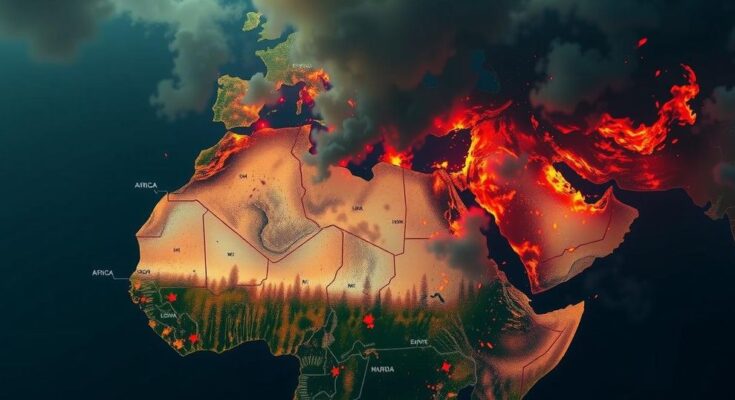Tensions are escalating in the Horn of Africa, with Ethiopia’s fragile internal dynamics threatening regional stability. Prime Minister Abiy Ahmed’s push for access to the Red Sea complicates relations with Somalia and invites external influences from Egypt, Turkey, and the UAE. As conflicts in Sudan and Somalia persist, it is imperative for the United States to address these rising tensions to prevent further humanitarian crises and global economic repercussions.
In the contemporary geopolitical landscape of the Horn of Africa, tensions are escalating once again, echoing a troubling pattern observed during previous electoral cycles in the United States. The tumultuous relationship between Ethiopia’s central government and the Tigray region erupted into conflict just as Americans cast their votes in November 2020, leading to a devastating war lasting approximately two years, which jeopardized the stability of Ethiopia as a nation. Although a cessation of hostilities agreement was reached in 2022, effectively curtailing the violence in Tigray, numerous unresolved issues persist, particularly concerning the repatriation of displaced individuals. Furthermore, the coalition initially formed by Prime Minister Abiy Ahmed to combat the Tigray conflict has begun to fracture, giving rise to ongoing civil strife in the Amhara and Oromia regions. As the United States approaches another presidential election with intensified competition among candidates, international conflicts continue to vie for attention, raising concerns that the renewed threats in the Horn of Africa may be overlooked. Prime Minister Abiy Ahmed’s determination to secure a direct route to the Red Sea has compelled neighboring nations to respond actively. His recent efforts to engage Somaliland—a self-governing area advocating for independence—in negotiations for port access have further strained Ethiopia’s already complicated relationship with Somalia. Moreover, Egypt, alarmed by the implications of the Grand Ethiopian Renaissance Dam on its water supply from the Nile, has sought alliances to exert pressure on Ethiopia, including recent military support to Somalia. Eritrea’s vested interest in maintaining regional instability has also driven it to facilitate discussions between Egypt and Somalia. The involvement of external powers with interests in the strategically significant Red Sea and Gulf of Aden complicates the situation further. Turkey has strengthened its relations with Somalia, while the United Arab Emirates maintains a close alliance with Abiy. The intricate geopolitical tapestry of this region heightens the potential for miscalculations to escalate into full-blown conflicts, prompting concern for the loss of life and broader implications for the global economy, particularly in terms of securing vital maritime shipping lanes. Humanitarian crises resulting from refugee flows are likely to burden receiving nations, impacting the international community as a whole. Currently, other regional conflicts also command little global attention; the ongoing civil war in Sudan is characterized as the most severe humanitarian catastrophe worldwide, with rising concerns of famine exacerbating the situation. The persistent instability within Somalia provides fertile ground for the resurgence of al-Shabaab, which appears to be forging ties with the Houthi militants of Yemen. In light of the pressing domestic political scenarios within the United States, it remains essential for the government to prioritize de-escalation efforts in the Horn of Africa, curtail proxy conflicts, and avert a more severe humanitarian disaster.
The Horn of Africa has been characterized by complex interrelations and conflicts, particularly surrounding Ethiopia and its neighbors. The recent history includes a brutal civil war initiated in November 2020 in Tigray, leading to wide-scale humanitarian crises. Although a ceasefire was established in 2022, the tensions have simply shifted rather than fully resolved, resulting in ongoing unrest in Amhara and Oromia. The region’s strategic importance, particularly concerning access to the Red Sea and the Nile waters, remains a significant factor in its geopolitical dynamics, influencing local and international actions.
The situation in the Horn of Africa presents a potentially volatile geopolitical landscape, with historical grievances and current ambitions driving regional actors toward heightened tensions. As the United States finds itself preoccupied with domestic electoral processes, the need for concerted diplomatic efforts to de-escalate conflicts and foster stability in this critical area has never been more urgent. Should these tensions escalate, the repercussions will resonate not only within the continent but also across the globe, affecting economic and humanitarian realms alike.
Original Source: www.cfr.org




